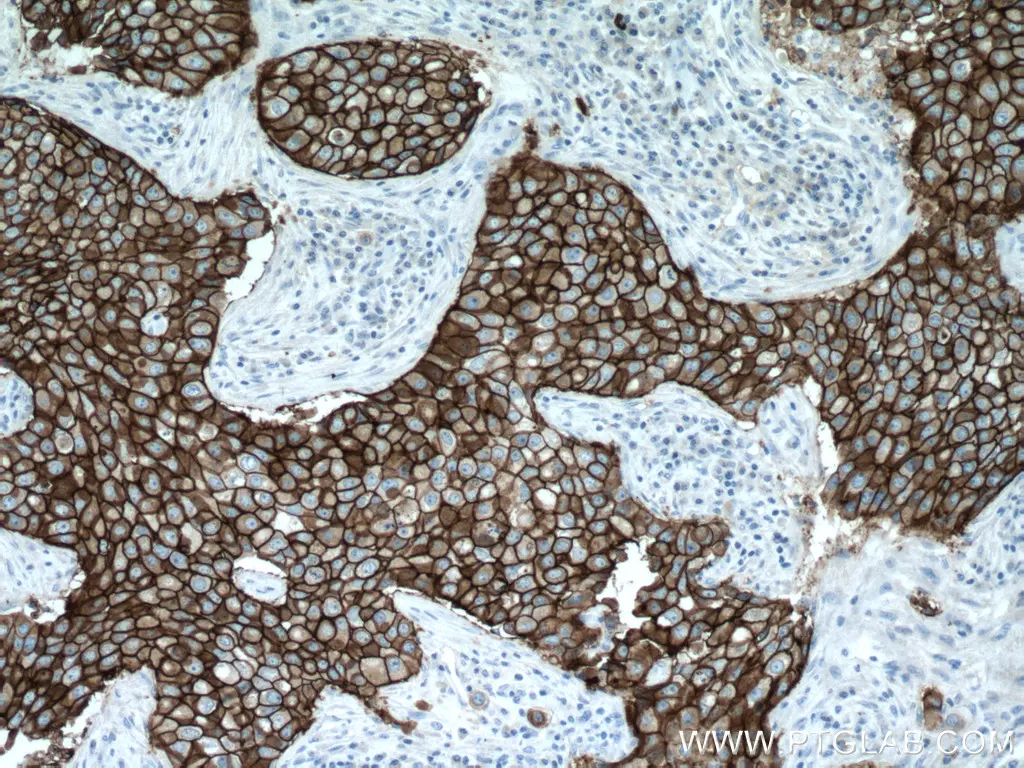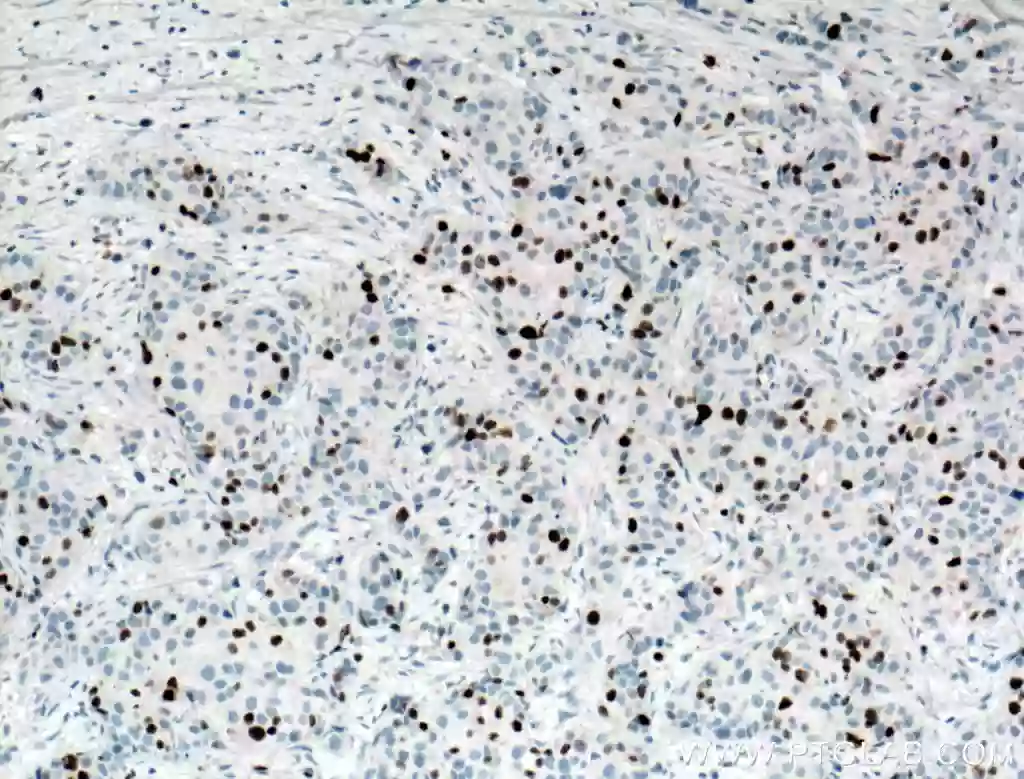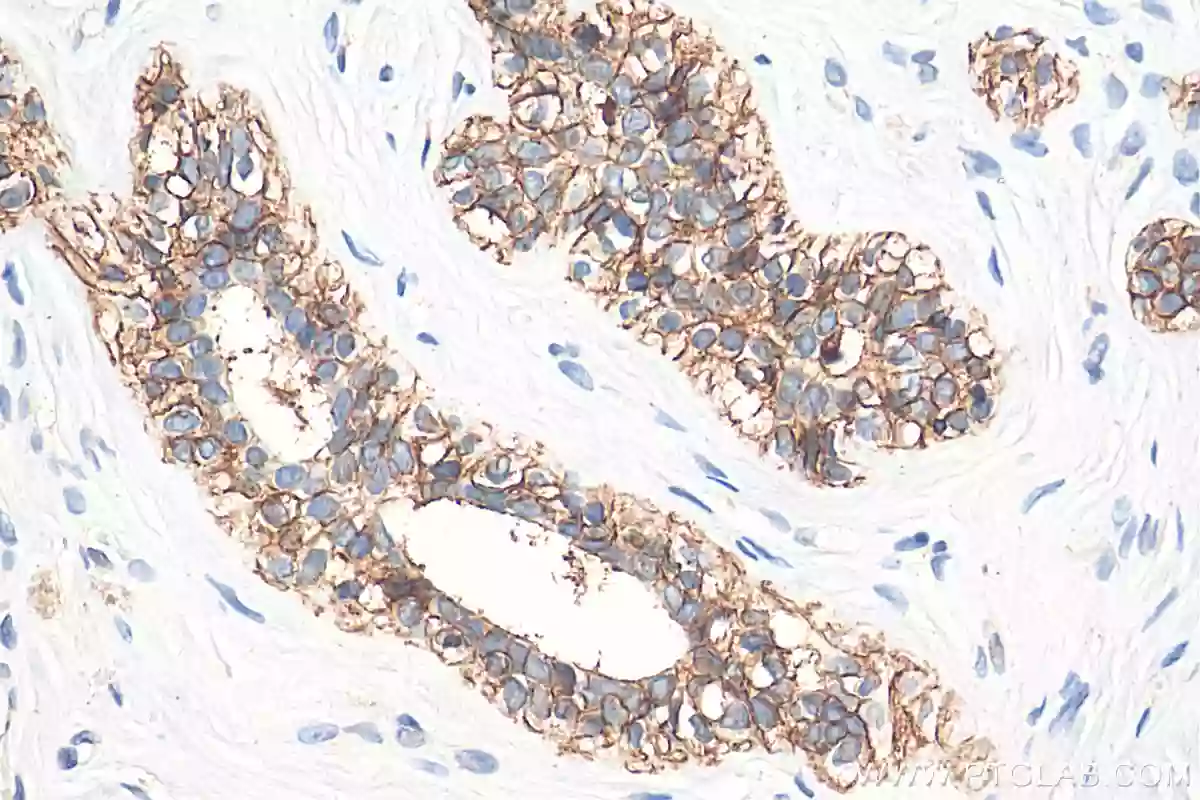Breast Cancer
Featured products used in the research of breast cancer

Introduction
Breast cancer is the most diagnosed cancer in women, representing about 1 in 3 new cases each year. It is also the most common cancer worldwide with about 2.3 million new cases in 2020. While the death rate from this disease has been steadily decreasing over the past 30 years, breast cancer remains the second leading cause of death amongst women. However, routine screening and early treatment prior to disease metastasis can allow affected women to live healthy lives. To help further the work of the rapidly growing research community, Proteintech offers many antibodies and IHC kits against both classical and emerging breast cancer targets.
Featured Markers
HER2/ErbB2
HER2 is a receptor for epidermal growth factors (EGFs). Signaling downstream of the HER2 receptor typically promotes cell growth and proliferation. HER2 is commonly upregulated in breast cancer cells; around 15% of breast cancers are HER2 positive. The HER2+ signal is also associated with a more aggressive phenotype. As a result, this receptor is a common target for many breast cancer therapies that attempt to halt cancer progression.

Immunohistochemical analysis of paraffin-embedded human breast cancer tissue slide using 18299-1-AP (HER2/ErbB2 antibody) at dilution of 1:600 (under 10x lens).
Ki67
Ki67 is a proliferation marker that is typically expressed in low levels in healthy breast tissue. It is often overexpressed in estrogen receptor (ER)-negative breast cancer cells and can hence be used to differentiate these cells from other forms of breast cancer. Ki67-positive breast cancers are known to have high rates of recurrence after initial treatment and a lower long-term, survival rate.

Immunohistochemical analysis of paraffin-embedded human breast cancer tissue slide using 27309-1-AP (Ki67 antibody) at dilution of 1:16000 (under 10x lens).
E-Cadherin
E-cadherin is a cell junction protein commonly expressed in breast epithelial tissue. Loss of E-cadherin is associated with these cells becoming more invasive and migratory in nature. Several breast cancers, such as invasive lobular carcinoma, do not express E-cadherin so the presence or lack of this signal can be used to characterize the invasiveness of developing breast carcinomas. Proteintech’s E-cadherin antibody has been cited over 1300 times, making it one of the top cited E-cadherin antibodies on the market.

Immunohistochemical analysis of paraffin-embedded human breast cancer tissue slide using 20874-1-AP (E-cadherin antibody) at dilution of 1:4000 (under 40x lens).
Antibodies for Breast Cancer Research
|
Function |
Marker |
PTG Catalog |
|
Cell Proliferation |
11026-1-AP |
|
|
26939-1-AP |
||
|
21244-1-AP |
||
|
18299-1-AP |
||
|
27309-1-AP |
||
|
10336-1-AP |
||
|
25871-1-AP |
||
|
20233-1-AP |
||
|
Cell Stemness |
14139-1-AP |
|
|
18330-1-AP |
||
|
60224-1-Ig |
||
|
Cell Survival |
14453-1-AP |
|
|
28076-1-AP |
||
|
Differentiation |
17513-1-AP |
|
|
17329-1-AP |
||
|
Metastasis |
16447-1-AP |
|
|
14695-1-AP |
||
|
20874-1-AP |
||
|
19970-1-AP |
||
|
10371-2-AP |
||
|
13801-1-AP |
||
|
10853-1-AP |
||
|
17968-1-AP |
||
|
Tumor Suppressor |
22362-1-AP |
|
|
10060-1-AP |
||
|
60283-2-Ig |
IHC Kits for Breast Cancer Research
|
Function |
Marker |
PTG Catalog |
|
Cell Proliferation |
KHC0303 |
|
|
KHC0038 |
||
|
KHC0095 |
||
|
Cell Stemness |
KHC0030 |
|
|
Differentiation |
KHC0204 |
|
|
KHC0034 |
||
|
Metastasis |
KHC0010 |
|
|
KHC0804 |
||
|
KHC0461 |
||
|
Tumor Suppressor |
KHC0079 |
References
Breast cancer. (2021, March 26). https://www.who.int/news-room/fact-sheets/detail/breast-cancer
Jerusalem, G., Lancellotti, P., & Kim, S. (2019). HER2+ breast cancer treatment and cardiotoxicity: monitoring and management. Breast Cancer Research and Treatment, 177(2), 237–250. https://doi.org/10.1007/s10549-019-05303-y
Singhai, R., Patil, V. W., Jaiswal, S., Patil, S., Tayade, M. B., & Patil, A. B. (2011). E-Cadherin as a diagnostic biomarker in breast cancer. North American Journal of Medical Sciences, 227–233. https://doi.org/10.4297/najms.2011.3227
Zhang, A., Wang, X. J., Fan, C., & Mao, X. (2021). The Role of Ki67 in Evaluating Neoadjuvant Endocrine Therapy of Hormone Receptor-Positive Breast Cancer. Frontiers in Endocrinology, 12. https://doi.org/10.3389/fendo.2021.687244
Related Content
Cancer stem cells as a key to cure cancer
Molecular markers for liver cancer

Support
Newsletter Signup
Stay up-to-date with our latest news and events. New to Proteintech? Get 10% off your first order when you sign up.